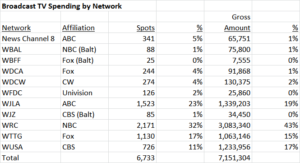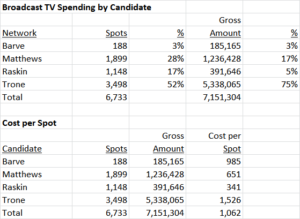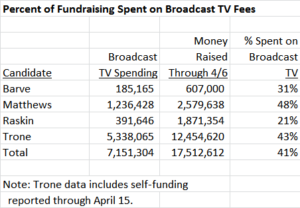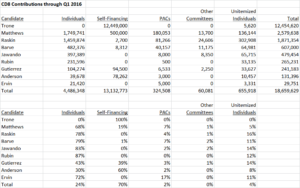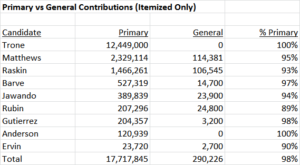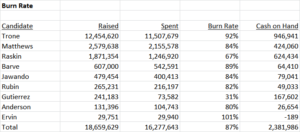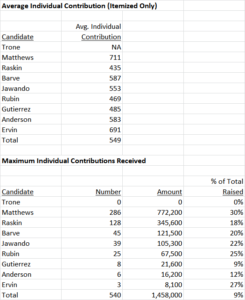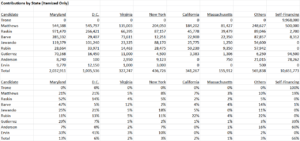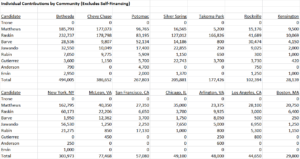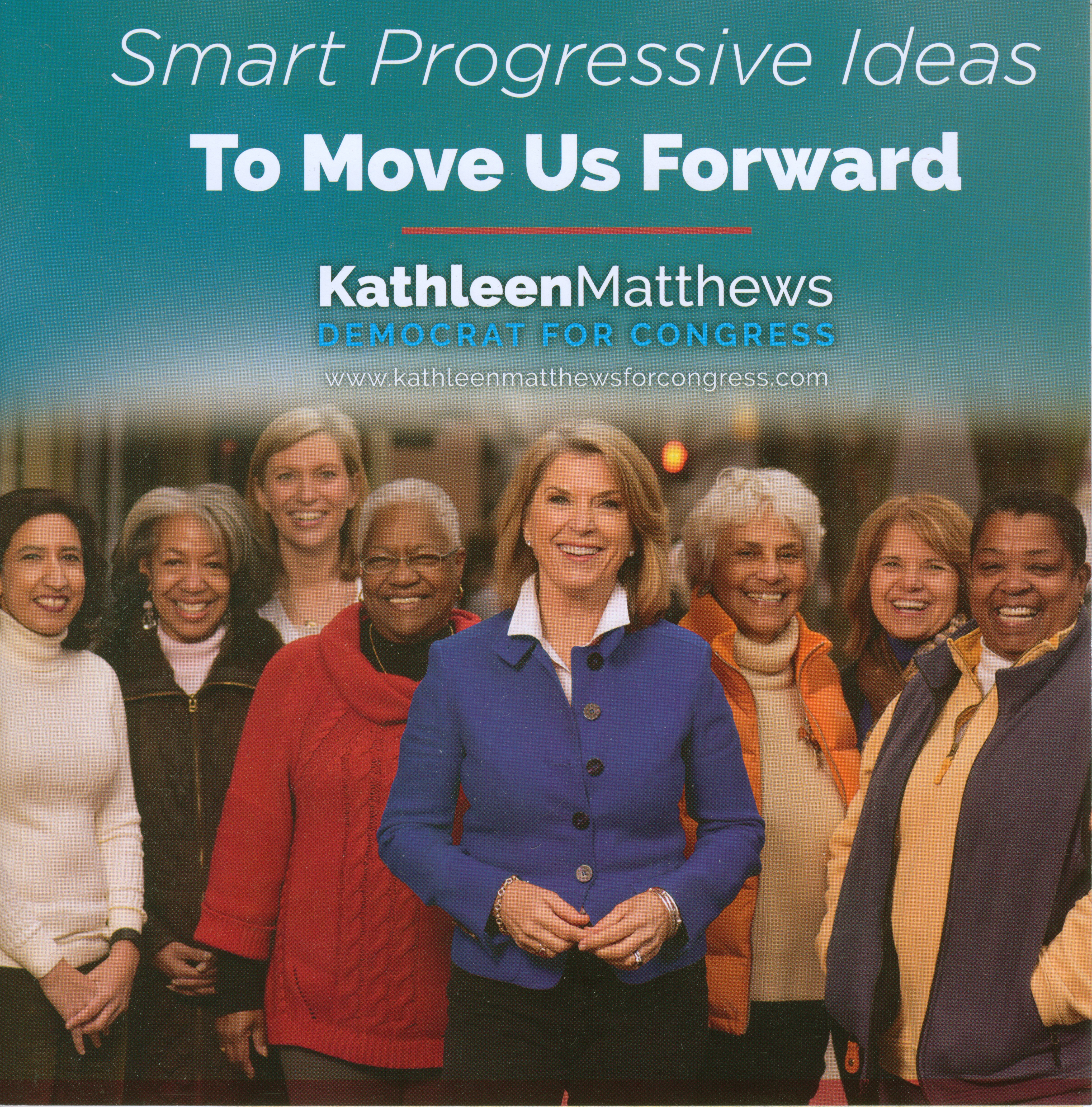Today, I’m pleased to present a guest post by Adam Pagnucco.
“All politics is local” according to the famous quote by former U.S. House Speaker Tip O’Neill. Moreover, any occasional viewer of Hardball, the MSNBC politics show featuring his former Chief of Staff Chris Matthews, can probably hear the host’s voice repeating it over and over. In fact, he actually titled an entire chapter of one of his books with that phrase and explored its meaning in detail.
So who would disagree with this hallowed political wisdom? Apparently, none other than Chris Matthews’ wife and current candidate for Congress in District 8, Kathleen Matthews.
Kathleen Matthews is a formidable candidate with many strengths. She has name recognition from her long-time career as a local news anchor that would make most candidates green with envy. She’s great on TV and radio. She’s smart, well-spoken and attractive. She raises all the resources she needs to win. And she is a female candidate running against a group of mostly men, which is a plus in a Democratic primary tilted heavily to female voters.
But her campaign is so generic that it would be equally applicable to someone running in California, Massachusetts or New York.
Check out her issues page and her Facebook page. Almost everything her campaign discusses is a national issue. There’s nothing inherently wrong with talking about national issues. Congress is a federal institution and deals with national and international matters. Gun control, the environment, education, the Middle East, women’s health and more are all important and she’s right to discuss them
The problem is that there’s almost no locally relevant content to go along with it. It feeds the vibe that her campaign is planned and executed by national-level, D.C.-connected operatives with no understanding of Montgomery, Carroll and Frederick Counties. And this is particularly surprising given the fact that Kathleen Matthews covered local issues as a journalist for twenty-five years.
Want to go local? Here’s how.
1. Metro
It’s impossible to understate the frustration that Metro riders have with WMATA. And how can one miss the drumbeat of local press coverage–assuming that one actually READS local press coverage? Riders want a fix and Members of Congress can play a big role. But Metro is buried in the Environment section of Matthews’ issues page.
Delegate Kumar Barve, one of Matthews’ opponents, gets it. Here is one of his many statements on Facebook about it. “METRO NEEDS TO BE FIXED!” blares Barve, echoing a sentiment with which few CD8 voters would disagree. Freshman Delegate Marc Korman made WMATA arguably his number one issue in 2014 and defeated a better-funded opponent with the Apple Ballot in Bethesda, an area where Matthews needs to do well. (Does any member of Matthews’ campaign staff know what an Apple Ballot is?)
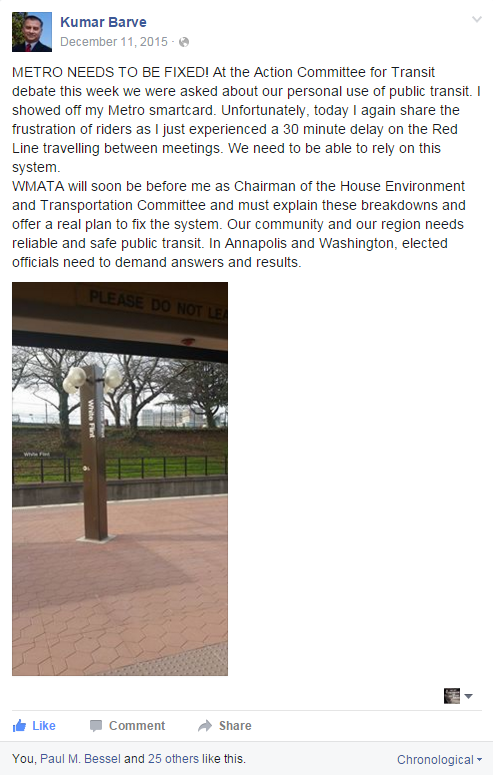
2. Other Transportation Issues
Transportation and education have been the two most important issues in Montgomery County since, well . . . no one here remembers when they weren’t the Big Two. But Matthews’ issues page has no transportation section. All of the key transportation solutions on the table required big federal bucks: the Purple Line, getting money for the Corridor Cities Transitway, remedying congestion on I-270, dealing with the American Legion Bridge and getting financing for Montgomery County’s proposed bus rapid transit system are all appropriate issues for federal involvement.
3. Immigration
This issue is both national and local and it is another no-show on the Matthews issues page. Many CD8 communities, including Takoma Park, Silver Spring and Wheaton, are filled with first- and second-generation immigrants of many nationalities. Barve and Delegate Ana Sol Gutiérrez are talking about this a lot and most CD8 candidates are addressing it. Is Matthews?
4. Localize National Issues
There are ways to talk about national issues while rooting them firmly in local affairs. Take a look at Senator Jamie Raskin’s issues page. He touches on many of the same matters as Matthews, but he discusses them in Maryland-specific terms while touting his specific accomplishments. Here are two more examples of Raskin discussing education and the environment employing a local frame. Whatever one may think of Raskin, he is definitely running in Maryland!
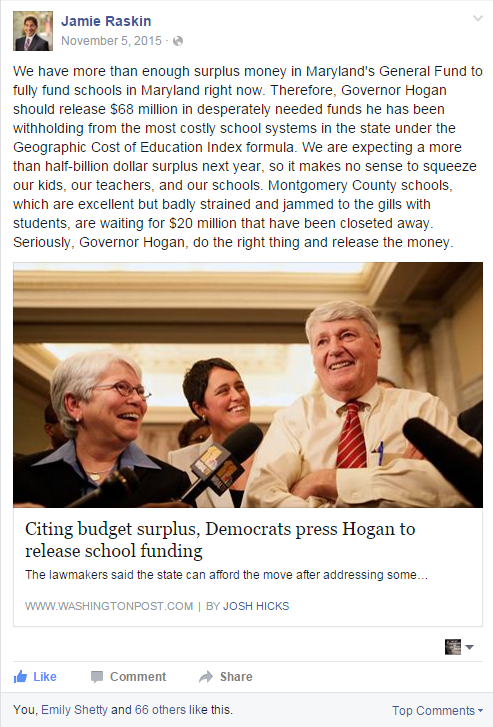

5. Meet the Neighbors
This is Raskin’s great strength. His campaign has deployed one of the best local field operations in recent memory and openly brags about its success. Raskin’s supporters extend beyond the establishment types (who can sometimes be a mixed blessing) and go down into the ranks of grass-roots activists–the kind of people who provide ground energy for campaigns. Some of his solicitations have so many names on them that even the most diligent reader can’t make it to the end. Does the Matthews campaign have lists of precinct officials, PTA officers, civic association board members and religious leaders to contact? How many of these local leaders have been asked to meet the candidate? Matthews is by many accounts an impressive person capable of making a good impression. How much is that strength being utilized?
6. Know Our History
The Annapolis establishment is mostly with Raskin, and the rest of it is with Barve. That’s not necessarily a problem for Matthews, as there is a certain segment of the electorate that dislikes political “bosses” and they respond well to perhaps her most important supporter, Comptroller Peter Franchot. So what does her campaign do? It lumps in news of Franchot’s endorsement with endorsements by two U.S. Senators with no connection to Maryland as well as former Lieutenant Governor Kathleen Kennedy Townsend.
Anyone with any knowledge of Maryland politics would know that Townsend was responsible for one of the most humiliating defeats in state Democratic Party history, the loss of the Governor’s seat to Republican Bob Ehrlich, and it all began when unknown retired retail clerk Bob Fustero got more than 20% of the vote in the Democratic primary. The Franchot endorsement is a big deal. It can be used to good effect with fiscally moderate Democrats, especially in Carroll and Frederick Counties, and it can be used to fuel a similar anti-establishment narrative to the one used by now-Congressman John Delaney in 2012. But announcing the Townsend endorsement at the same time sent a signal to anyone acquainted with state politics that Matthews’ campaign has little understanding of our history or current political scene.
One more thing. Where is former County Executive Doug Duncan? He may be Matthews’ most prominent local supporter other than Franchot and he has a sizeable following in Montgomery County. He was a key early backer of John Delaney. But he is not mentioned at all on Matthews’ website.
7. Come Out Strong on a Hot Local Issue
Speaking of the Comptroller, he has a knack for latching onto hot local issues that help him build his base. For example, what do air conditioners in Baltimore County Public Schools have to do with the Comptroller’s core duties of tax collection and regulation of alcohol and tobacco? Absolutely nothing. But Franchot and Governor Larry Hogan are using the issue to bedevil a common adversary, Baltimore County Executive Kevin Kamenetz, and are fortifying their support in one of the state’s key jurisdictions.
The counterpart issue in Montgomery County is the county’s notorious liquor monopoly, on which the Comptroller has been a resolute opponent. David Lublin has written of the substantial opportunities available to any politician who dares to challenge the county employee union and call for open competition. Even if you disagree with me on the issue (and I am its organizer), consider three facts:
First, a substantial number of Democrats want the alcohol laws to be reformed. Second, if just one candidate in a multi-candidate race agrees with that position, those voters will flow towards that one candidate and away from the others, creating an advantage. And third, the monopoly’s principal defender, the county employee union, would never endorse Matthews no matter what since there are several other candidates in the field with long pro-labor voting records. So Matthews has nothing to lose and everything to gain. Why not call for Ending the Monopoly and pick up some votes?
Look, folks. Kathleen Matthews is a top-tier candidate and she could definitely win. But if she doesn’t, this is why: so far, her campaign does not believe that All Politics is Local. Or really, that Any Politics is Local at All.

